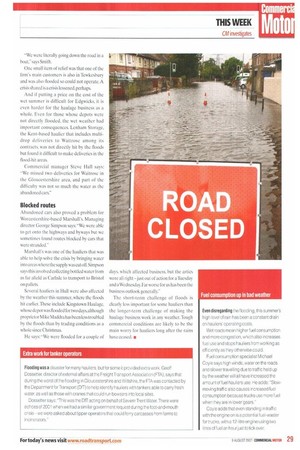Weathering the crisis
Page 28

Page 29

If you've noticed an error in this article please click here to report it so we can fix it.
A wet summer does more than leave the countryside waterlogged. It also affects hauliers' costs and in some cases their ability to operate at ail. David Harris finds out more.
This summer's floods have had a high cost — socially, commercially and emotionally. While insurance liabilities are quantifiable (see page 36), some other costs are more diffuse yet hit harder.
You would need a hard heart not to sympathise with Tewkesbury, Glos-based general haulier Edgwicks Transport. The floods hit this 30-vehicle operator so badly that its back office was under four feet of water and its garage was flooded — and even when the water subsided, the premises were left caked in mud and filth.
At least the trucks should be all right, says company secretary Roger Smith — the water stopped them operating but did not destroy them.This is more than can be said for the filing cabinets, which still cannot be opened because they filled with water and the paper swelled into a boggy mass.
There are some limited practical steps the company can take to protect itself in the future, such as moving the filing cabinets upstairs, but essentially any real change will have to come from improved flood defences for the town as a whole.
For the week that Tewkesbury was effectively cut off, the day-to-day work of the business had to stop. Not only were the vehicles waterlogged, but several of the drivers' homes were flooded and they found it very difficult to get to work. "We were literally going down the road in a boat," says Smith.
One small item of relief was that one of the firm's main customers is also in Tewkesbury and was also flooded so could not operate. A crisis shared is a crisis lessened, perhaps.
And if putting a price on the cost of the wet summer is difficult for Edgwieks, it is even harder for the haulage business as a whole. Even for those whose depots were not directly flooded, the wet weather had important consequences. Lenham Storage, the Kent-based haulier that includes multidrop deliveries to Waitrose among its contracts, was not directly hit by the floods but found it difficult to make deliveries in the flood-hit areas.
Commercial manager Steve Hall says: "We missed two deliveries for Waitrose in the Gloucestershire area, and part of the difficulty was not so much the water as the abandoned cars."
Blocked routes
Ahancioned cars also proved a problem for Worcestershire-based Marshall's. Managing director George Simpson says: "We were able to get onto the highways and byways but we sometimes found routes blocked by cars that were stranded."
Marshall's was one of the hauliers that was able to help solve the crisis by bringing water into areas where the supply was cut off. Simpson says this involved collecting bottled water from as far afield as Carlisle to transport to Bristol on pallets.
Several hauliers in Hull were also affected by the weather this summer, where the floods hit earlier. These include Kingstown Haulage, whose depot was flooded for two days, al though proprietor Mike Maddra has been less troubled by the floods than by trading conditions as a whole since Christmas.
He says: "We were flooded for a couple of
days, which affected business, but the artics were all right —just out of action for aTuesday and a Wednesday. Far worse for us has been the business outlook generally."
The short-term challenge of floods is clearly less important for some hauliers than the longer-term challenge of making the haulage business work in any weather. Tough commercial conditions are likely to be the main worry for hauliers long after the rains have ceased. •






















































































































































































